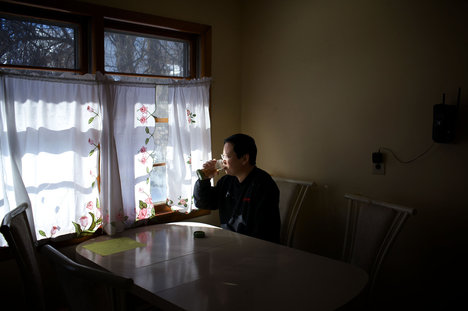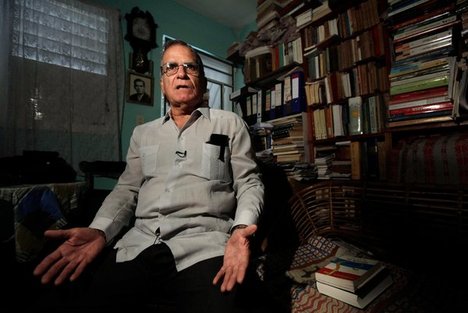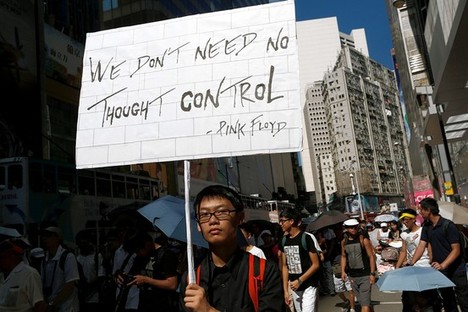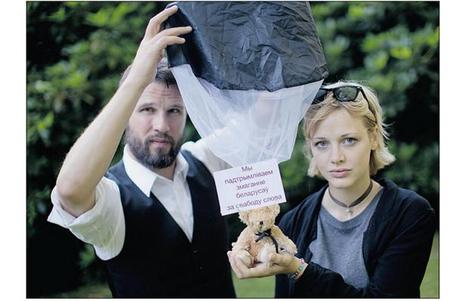In the old days a “liberal” was someone who believed in freedom, including free markets and minimal government. Milton Friedman defended “liberal” in its original sense in his article “Liberalism, Old Style.”
At some point the left hijacked the word, at least in the United States. (I understand that in much of the rest of the world “liberal” still retains more of its original meaning.)
Maybe there’s some defensible justification for hijacking a word, but most of the time it seems like a dishonest and cowardly way to win an argument by muddying up the debate.
Dan Klein and Kevin Frei are trying to reclaim the word “liberal” from the pirates of the left. As part of their effort, they have proclaimed June 16th to be “Liberalism Day.”
I believe their cause is just, but I am not sure it is efficient. Time and effort are scarce, so we must pick our battles.
On the other hand, the meaning of “libertarian” has narrowed over recent decades. It used to be that most libertarians believed in minimal government; increasingly more libertarians endorse anarchism. It used to be that most libertarians believed in national defense; increasingly more libertarians endorse total isolationism.
I do believe in some minimal night-watchman state, and I do believe that sometimes there is evil in the world that must be fought. So maybe I should start calling myself a “liberal” in the original sense, what Friedman called a “classical liberal”?
Category: Free Speech
Bloomberg Blasts University Faculty Intolerance for Conservative Ideas
(p. A11) From former New York City Mayor Michael Bloomberg’s commencement address at Harvard University, May 29:
Repressing free expression is a natural human weakness, and it is up to us to fight it at every turn. Intolerance of ideas–whether liberal or conservative–is antithetical to individual rights and free societies, and it is no less antithetical to great universities and first-rate scholarship.
There is an idea floating around college campuses–including here at Harvard–that scholars should be funded only if their work conforms to a particular view of justice. There’s a word for that idea: censorship. And it is just a modern-day form of McCarthyism.
. . .
In the 2012 presidential race, according to Federal Election Commission data, 96% of all campaign contributions from Ivy League faculty and employees went to Barack Obama.
Ninety-six percent. There was more disagreement among the old Soviet Politburo than there is among Ivy League donors.
. . .
Diversity of gender, ethnicity, and orientation is important. But a university cannot be great if its faculty is politically homogenous. In fact, the whole purpose of granting tenure to professors is to ensure that they feel free to conduct research on ideas that run afoul of university politics and societal norms.
When tenure was created, it mostly protected liberals whose ideas ran up against conservative norms.
Today, if tenure is going to continue to exist, it must also protect conservatives whose ideas run up against liberal norms. Otherwise, university research–and the professors who conduct it–will lose credibility.
Great universities must not become predictably partisan. And a liberal arts education must not be an education in the art of liberalism.
For the full commentary, see:
Mike Bloomberg. “Notable & Quotable: Mike Bloomberg at Harvard.” The Wall Street Journal (Sat., May 31, 2014): A11.
(Note: ellipsis added; italics in original.)
(Note: the online version of the commentary has the date May 30, 2014.)
“Religious Muslims Generally Insist on the Literal Truth of the Quran”
(p. A16) There are few role models for former Muslims, . . .
One group . . . is Ex-Muslims of North America, . . .
Members of the group, founded last year in Washington and Toronto, recognize that their efforts might seem radical to some, and take precautions when admitting new members. Those interested in joining are interviewed in person before they are told where the next meeting will be held. The group has grown quickly to about a dozen chapters, in cities including Boston, Chicago, Houston, New York and San Francisco.
One of the group’s founders who was at the conference, Sadaf Ali, 23, an Afghan-Canadian, said that she had once been “a fairly practicing Muslim.”
During childhood, she said, “I was always fairly defiant.” As she grew older, she struggled with depression, and she thought that praying more and reading the Quran would help. She became more religious and looked forward to a traditional life. “I thought my life was sort of set out for me: get married, have children,” Ms. Ali said. “I might go to school. I’ll have a very domestic life. That’s what my family did, what my forefathers did.”
But as a university student, her feelings began to change.
As I started to investigate the religion, I realized I was talking to myself,” Ms. Ali said. “Nobody was listening to me. I had just entered the University of Toronto, and critical thinking was a big part of my studies. I have an art history and writing background, and I realized every verse I had come across” — in the Quran — “was explicitly or implicitly sexist.”
Quickly, her faith crumbled.
“So in 2009, I realized there probably is no God,” she said. “What is so wrong in having a boyfriend, or having premarital sex? What is wrong with wanting to eat and drink water before the sun goes down during Ramadan? What is so wrong with that? I couldn’t handle the cognitive dissonance anymore.”
. . .
The members of Ex-Muslims are adamant that they respect others’ right to practice Islam. The group’s motto is “No Bigotry and No Apologism,” and text on its website is inclusive: “We understand that Muslims come in all varieties, and we do not and will not partake in erasing the diversity within the world’s Muslims.”
But they are equally adamant that it is still too difficult for Muslims inclined to atheism to follow their thinking where it may lead. Whereas skeptical Christians or Jews can take refuge in reformist wings of their tradition, religious Muslims generally insist on the literal truth of the Quran.
“I would say it’s maybe 0.1 percent who are willing to challenge the foundations of the faith,” said Nas Ishmael, another founder of the Ex-Muslims group who attended the conference.
For the full story, see:
MARK OPPENHEIMER. “Leaving Islam for Atheism, and Finding a Much-Needed Place Among Peers.” The New York Times (Sat., MAY 24, 2014): A16.
(Note: ellipses added.)
(Note: the online version of the story has the date MAY 23, 2014.)
Bill Clinton Says U.S. Control of Internet Protects Free Speech
(p. A11) . . . , Mr. Clinton, appearing on a panel discussion at a recent Clinton Global Initiative event, defended U.S. oversight of the domain-name system and the Internet Corporation for Assigned Names and Numbers, or Icann.
. . .
“I understand why the reaction in the rest of the world to the Edward Snowden declarations has given new energy to the idea that the U.S. should not be in nominal control of domain names on the Internet,” Mr. Clinton said. “But I also know that we’ve kept the Internet free and open, and it is a great tribute to the U.S. that we have done that, including the ability to bash the living daylights out of those of us who are in office or have been.
“A lot of people who have been trying to take this authority away from the U.S. want to do it for the sole purpose of cracking down on Internet freedom and limiting it and having governments protect their backsides instead of empower their people.”
Mr. Clinton asked Jimmy Wales, founder of Wikipedia: “Are you at all worried that if we give up this domain jurisdiction that we have had for all these years that we will lose Internet freedom?”
“I’m very worried about it,” Mr. Wales answered. People outside the U.S. often say to him, “Oh, it’s terrible. Why should the U.S. have this special power?” His reply: “There is the First Amendment in the U.S., and there is a culture of free expression.”
He recalled being told on Icann panels to be more understanding of differences in cultures. “I have respect for local cultures, but banning parts of Wikipedia is not a local cultural variation that we should embrace and accept. That’s a human-rights violation.”
For the full commentary, see:
L. GORDON CROVITZ. “INFORMATION AGE; Open Internet: Clinton vs. Obama; The former president strongly defends the current system of oversight by the U.S.” The Wall Street Journal (Mon., MARCH 31, 2014): A11.
(Note: ellipses added.)
(Note: the online version of the commentary has the shorter title “INFORMATION AGE; Open Internet: Clinton vs. Obama.”)
18 Unions Each Spent More on Politics than Koch Brothers
(p. A13) Harry Reid is under a lot of job-retention stress these days, so Americans might forgive him the occasional word fumble. When he recently took to the Senate floor to berate the billionaire brothers Charles and David Koch for spending “unlimited money” to “rig the system” and “buy elections,” the majority leader clearly meant to be condemning unions.
It’s an extraordinary thing, in a political age obsessed with campaign money, that nobody scrutinizes the biggest, baddest, “darkest” spenders of all: organized labor. The IRS is muzzling nonprofits; Democrats are “outing” corporate donors; Jane Mayer is probably working on part 89 of her New Yorker series on the “covert” Kochs. Yet the unions glide blissfully, unmolestedly along. This lack of oversight has led to a union world that today acts with a level of campaign-finance impunity that no other political giver–conservative outfits, corporate donors, individuals, trade groups–could even fathom.
. . .
The Center for Responsive Politics’ list of top all-time donors from 1989 to 2014 ranks Koch Industries No. 59. Above Koch were 18 unions, which collectively spent $620,873,623 more than Koch Industries ($18 million).
For the full commentary, see:
KIMBERLEY A. STRASSEL. “POTOMAC WATCH; The Really Big Money? Not the Kochs; Harry Reid surely must have meant the unions when he complained about buying elections.” The Wall Street Journal (Fri., March 7, 2014): A13.
(Note: ellipsis added.)
(Note: the online version of the commentary has the date March 6, 2014.)
Environmentalists Seek to Silence Those Who Dare to Disagree
(p. A13) Surely, some kind of ending is upon us. Last week climate protesters demanded the silencing of Charles Krauthammer for a Washington Post column that notices uncertainties in the global warming hypothesis. In coming weeks a libel trial gets under way brought by Penn State’s Michael Mann, author of the famed hockey stick, against National Review, the Competitive Enterprise Institute, writer Rand Simberg and roving commentator Mark Steyn for making wisecracks about his climate work. The New York Times runs a cartoon of a climate “denier” being stabbed with an icicle.
These are indications of a political movement turned to defending its self-image as its cause goes down the drain.
For the full commentary, see:
HOLMAN W. JENKINS, JR. “BUSINESS WORLD; Personal Score-Settling Is the New Climate Agenda; The cause of global carbon regulation may be lost, but enemies still can be punished.” The Wall Street Journal (Sat., March 1, 2014): A13.
(Note: the online version of the commentary has the date Feb. 28, 2014, and has the title “BUSINESS WORLD; Jenkins: Personal Score-Settling Is the New Climate Agenda; The cause of global carbon regulation may be lost, but enemies still can be punished.”)
The Krauthammer column that the environmentalists do not want you to read:
Krauthammer, Charles. “The Myth of ‘Settled Science’.” The Washington Post (Fri., Feb. 21, 2014): A19.
Fired Dissident Xia Yeliang Warns that Chinese Universities Do Not Value Academic Freedom
 “Xia Yeliang in New Jersey. Professor Xia, whose firing by Peking University provoked an outcry, is joining the Cato Institute.” Source of caption and photo: online version of the NYT article quoted and cited below.
“Xia Yeliang in New Jersey. Professor Xia, whose firing by Peking University provoked an outcry, is joining the Cato Institute.” Source of caption and photo: online version of the NYT article quoted and cited below.
(p. A10) A Chinese dissident, dismissed from his job as an economics professor at Peking University after clashes with his government over liberalization, will become a visiting fellow at the Cato Institute on Monday, he said.
In an interview on Friday, the dissident, Xia Yeliang, warned that American universities should be careful about partnerships with Chinese universities. “They use the reputations of Western universities to cover their own scandals,” he said.
“Perhaps Western universities do not realize that Chinese universities do not have the basic value of academic freedom, and try to use Western universities to cover their bad side,” Professor Xia added.
For the full story, see:
TAMAR LEWIN. “Chinese Dissident Lands at Institute With a Caution to Colleges.” The New York Times (Mon., FEB. 10, 2014): A10.
(Note: the online version of the story has the date FEB. 9, 2014, and has the title “Chinese Dissident Lands at Cato Institute With a Caution to Colleges.”)
Castro First Fired, and Then Jailed, Economist Chepe, Who Defended Capitalism
 “Oscar Espinosa Chepe in 2010.” Source of caption and photo: online version of the NYT obituary quoted and cited below.
“Oscar Espinosa Chepe in 2010.” Source of caption and photo: online version of the NYT obituary quoted and cited below.
(p. B15) Oscar Espinosa Chepe, a high-ranking Cuban economist and diplomat who became a vocal critic of Fidel Castro in the 1990s but chose to remain in Cuba, despite enduring harassment and imprisonment, died on Monday [September 23, 2013] . . .
. . .
Mr. Espinosa Chepe (pronounced CHEH-pay) lost his job as an official of the National Bank of Cuba in 1996 after advocating the limited restoration of capitalist principles like the right to buy and sell one’s home or start a business.
He then became a journalist, writing articles for American and Spanish-language Web sites in which he used statistical data to analyze Cuba’s economic problems. In March 2003 he was one of 75 activists arrested as part of a government crackdown on dissent known as the Black Spring.
. . .
Mr. Espinosa Chepe, who joined Castro’s revolutionary government in the early 1960s and was once head of the powerful Office of Agrarian Reform, had frequently clashed with fellow economic planners over policies he considered overly dogmatic.
His internal critique became increasingly adamant after 1991, when the loss of the Soviet Union’s financial support began taking a devastating toll on the country’s economy. But his proposals for change, many of which had already been adopted in former Soviet bloc states, were labeled counterrevolutionary, said Carmelo Mesa-Lago, a professor emeritus of economics and Latin American studies at the University of Pittsburgh and an expert on Cuban economic policies.
For the full obituary, see:
PAUL VITELLO. “Oscar Espinosa Chepe, Cuban Economist and Castro Critic, Dies at 72.” The New York Times (Fri., September 27, 2013): B15.
(Note: ellipses, and bracketed date, added.)
(Note: the online version of the obituary has the date September 25, 2013.)
Williams Made Providence a Sanctuary for the Persecuted
Source of book image: http://d.gr-assets.com/books/1320716933l/11797348.jpg
I have not yet read Barry’s book on Roger Williams, but I did enjoy and learn from his earlier The Great Influenza book.
(p. 12) Williams struck overland, through snow and bitter cold, “wch I feele yet,” he reminisced later in life. He survived because he had help. “The ravens fed me in the wilderness,” he said, comparing himself to the scriptural prophets sustained by bird-borne morsels, though his “ravens” were Indians. With their assistance, he reached the upper bend of a bay that would be named for its inhabitants, the Narragansett. There, Williams bought land from its native proprietors and established a settlement he called Providence, to honor the divine assistance given to him and other Christians on their flights from persecution.
. . .
Next, Williams refused to take an oath of fidelity to Massachusetts, on the grounds that anything sworn in God’s name for worldly purposes was corrupt.
The authorities in Massachusetts were so outraged that having failed to arrest Williams, they tried to obliterate his new settlement. He went back to England to get a charter to protect his colony on his own terms: with a “hedge or wall of Separation between the Garden of the Church and the Wildernes of the world.” In several publications, he argued that the individual conscience should not — could not — be governed, let alone persecuted. If God was the ultimate punisher of sin, it was impious for humans to assume his authority. And it was “directly contrary to the nature of Christ Jesus . . . that throats of men should be torne out for his sake.”
Barry shows how controversial these beliefs were at the time, and in this way reinforces the standard image of Williams as an early proponent of liberty of conscience.
For the full review, see:
JOYCE E. CHAPLIN. “Errand in the Wilderness.” The New York Times Book Review (Sun., May 26, 2012): 12.
(Note: ellipsis between paragraphs was added; ellipsis internal to quotation was in original.)
(Note: the online version of the review has the date May 25, 2012 and has the title “Roger Williams: The Great Separationist.”)
The book being reviewed, is:
Barry, John M. Roger Williams and the Creation of the American Soul: Church, State, and the Birth of Liberty. New York: Viking Adult, 2012.
“We Don’t Need No Thought Control”
 “In Hong Kong, protesters march against Beijing’s introduction of ‘Chinese patriotism classes’ in schools.” Source of caption and photo: online version of the WSJ article quoted and cited below.
“In Hong Kong, protesters march against Beijing’s introduction of ‘Chinese patriotism classes’ in schools.” Source of caption and photo: online version of the WSJ article quoted and cited below.
(p. A11) Consider the . . . scene in Hong Kong, where tens of thousands of parents, teachers and students protested an effort by Beijing to re-educate the inhabitants of the former British colony, which reverted to the mainland in 1997.
Hong Kong people objected to a government-funded booklet titled, “The China Model,” which was supposed to educate them in the patriotic ways of the mainland. It celebrates China’s one-party Communist regime as “progressive, selfless and united” while criticizing the U.S. political system as having “created social turbulence.”
There is no reference to the Cultural Revolution or Tiananmen Square–history also suppressed on the mainland, where the Web is largely censored. The booklet even encourages Hong Kong people to learn how to “speak cautiously,” a highly unlikely development to those of us who have lived in Hong Kong with its often pungently plain-spoken citizens.
The chairman of the pro-Beijing China Civic Education Promotion Association in Hong Kong, Jiang Yudui, tried to defend the booklet by saying, “If there are problems with the brain, then it needs to be washed, just like dialysis for kidney patients.”
This led the Hong Kong education secretary to back away, assuring that, “Brainwashing is against Hong Kong’s core values and that’s unacceptable to us.” Meanwhile, Hong Kong’s sophisticated protesters carried banners that included lyrics from British rock group Pink Floyd, “We don’t need no thought control.”
For the full commentary, see:
L. GORDON CROVITZ. “INFORMATION AGE; Brainwashing in the Digital Era.” The Wall Street Journal (Mon., August 6, 2012): A11.
(Note: ellipsis added.)
(Note: the online version of the article was dated August 5, 2012.)
The Bear Details of Belarus Communist Tyranny
 “Swedish advertising agency employees Thomas Mazetti and Hannah Frey hold a stuffed bear that was parachuted into Belarus.” Source of caption and image: http://www.theprovince.com/business/Teddy+bears+make+picnic+generals/7028460/story.html
“Swedish advertising agency employees Thomas Mazetti and Hannah Frey hold a stuffed bear that was parachuted into Belarus.” Source of caption and image: http://www.theprovince.com/business/Teddy+bears+make+picnic+generals/7028460/story.html
(p. A4) The plane crossed stealthily into Belarussian airspace and headed for the capital, Minsk. At the appointed moment, the cargo doors opened, and an invasion force of tiny plush freedom fighters parachuted to the ground.
Belarus was under attack — by teddy bears.
Three members of a Swedish advertising firm planned and carried out the operation last month, adorning more than 800 plush bears with signs promoting democracy and denigrating Belarus’s authoritarian government.
Comedic touches aside, the security breach has become a major embarrassment for President Aleksandr G. Lukashenko, who has channeled his country’s meager resources into maintaining a calcified police state.
For the full story, see:
MICHAEL SCHWIRTZ. “Teddy Bears Fall From Sky, and Heads Roll in Minsk.” The New York Times (August 2, 2012): A4.
(Note: the online version of the article has the date August 1, 2012.)


